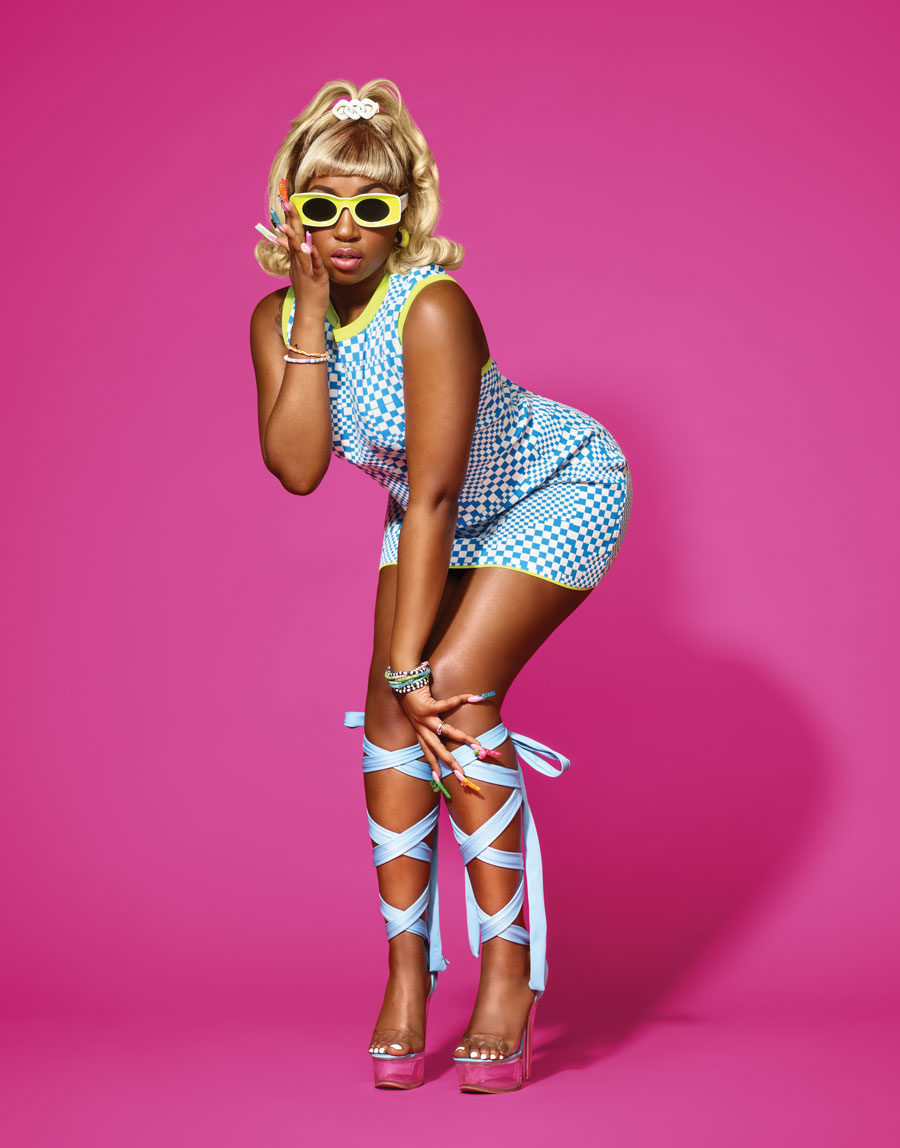
Photograph by Alex Martinez, STYLIST: RAY C’MONE; HAIR: HAIR BY AUDI; MAKEUP: ERICA BOGART
Yung Baby Tate realized she’d entered a new phase in her career—and her life—one afternoon in July as she was stepping off the elevator in her Atlanta apartment building. “Have a good night,” she said to the guy she’d shared the elevator with—a total stranger. “All right,” the guy replied. “See you on Love & Hip Hop.”
If the stranger in the elevator was eager for Tate’s small-screen debut, so were Tate and her friends. She’d purchased Hulu Live and a new 55-inch television—“I had to get a bigger one because [the older TV] wasn’t hitting”—so she could host her mom and friends at her downtown apartment for the premiere. Inside her living room, the group screamed at the sight of themselves on TV, immediately replaying their scene at Southwest Atlanta’s Cascade Skating Rink. (Tate says she would’ve filmed at the Golden Glide, the rink in her native Decatur, if she had her way.)
It’s a few days after the elevator encounter and less than 24 hours since Tate’s debut on VH1’s Love & Hip Hop: Atlanta when we meet at No Mas Cantina, the popular Mexican restaurant off Peters Street. Tate, wearing a long blonde wig and a white halter top with gray and navy swirls, is still reeling from the night before. In the past few years, Yung Baby Tate has become part of the growing number of women, from Atlanta and beyond, who have captured the spotlight in rap. Hip-hop fans who might not recognize Tate in person know her music, whether it’s her tracks featured on HBO’s Insecure, her infectious remake of Nicki Minaj’s “Megatron,” or her empowering anthem “I Am.” The latter garnered millions of plays across more than 300,000 TikTok videos, during which users claimed the affirmations—“I am healthy, I am wealthy, I am rich, I am that bitch”—as their own.
Tate’s most recent album, After the Rain (her follow-up to 2019’s GIRLS, for which she sang, rapped, and produced), found her trading sugary anthems for more reflective and vulnerable cuts about surviving heartbreak and hardships. Tate credits her growth between the two albums to the uncertainty she and everyone else felt during the pandemic: “I think it made me feel like I have to be more real. More honest,” she says. “The whole bragging, I got this, I got that . . . We don’t fucking care.” That doesn’t mean she’s being humble about her musical skills, though. On After the Rain standout “Rainbow Cadillac,” she transforms a Danity Kane hit (“Show Stopper”) into a bass-heavy song where she raps, “I get checks / They’re thick and super juicy / Call them Lizzo.”
Now, Tate’s branching out into reality TV, hoping to reach an even larger audience and dodge the drama associated with Love & Hip Hop, an 11-year-old VH1 franchise that chronicles the lives of people (and their significant others) who work in hip-hop, both in front of the mic and behind the scenes. Originally focusing on New York, the show has since expanded to include series in LA, Miami, and Atlanta.
For Tate, the move comes with some risks. Anyone who suspects that the drawbacks of appearing on Love & Hip Hop might outweigh the benefits could find a long list of examples from the franchise’s back catalog to confirm their skepticism. The series is notorious for physical and verbal altercations and sensationalized relationship drama that overshadows cast members’ actual work within the music industry—hardly productive for new rappers hoping to be taken seriously. Rapper Cardi B is the only former cast member who has managed to launch a music career successful enough to eclipse her time on the show.
So far, filming for Love & Hip Hop during the pandemic has proved beneficial. Because of safety protocols, Tate hasn’t interacted much with other cast members, instead shooting with her friends, manager, and love interest, the rapper Guapdad 4000. “I think it is amazing that she’s been able to do it her way,” her manager, Quinn Goydish, says. According to the two, Viacom selected Tate in an effort to revamp the series’ reputation and focus more on local artists’ music instead of their drama.

Photograph by Alex Martinez
Tate Farris always felt like a career in the music industry was within her reach. She also understood the inherent paradoxes of success in entertainment. Her mother is Dionne Farris, a singer and songwriter who earned a Grammy in 1992, with the group Arrested Development, for the hit “Tennessee.” Still, Tate—Dionne’s only child—would walk by that award some mornings without any lunch money to bring to school. “There were times when we were way up, and there were times when we were way down,” she says. “Growing up, because people knew who my mom was, everyone always assumed we were rich and I was this bougie, spoiled girl.” Shortly before Tate was born, her mother signed to Columbia Records, releasing singles such as 1995’s “I Know,” which would reach the top 10 on the Billboard Hot 100 and earn her another Grammy nod. By 2008, Dionne had parted ways with the label and begun to release music independently, a move that came with much-desired creative freedom but also economic uncertainty.
Tate’s dreams of being a multihyphenate entertainer were encouraged at home by her mom and at the performing arts schools she attended (DeKalb Elementary School of the Arts and DeKalb School of the Arts). The young artist, who, toward the end of high school, switched her major from vocal to drama—she said she didn’t like her teacher and already knew how to sing—began producing her own music around the age of 13. Inspired by the versatility of rappers like Nicki Minaj, Tate made music that took influences from R&B, hip-hop, pop, and rock. Often, when iTunes made her designate a “genre” while uploading a song, she’d just put her own name in the field. I’m not categorizing. I’m not boxing myself in, she thought. I’m just making music.
As she prepares to return to the studio this fall to record her next project (slated for release in 2022), Tate wants to show the world that Atlanta’s superstar women are just as capable of driving the music game as its men. “I pray that rappers like myself, Latto, and [LightSkinKeisha] bring it home for the girls—make people pay attention,” she says. “Atlanta is not just trap. It’s not just Future, Migos, and Lil Baby.”
She’ll have Goydish and her mom to help her along the way, especially as she considers a new label—her previous contract with Issa Rae’s company Raedio ended earlier this year. Speaking of the now defunct partnership, Rae told Paper Mag last April that she signed Tate to her label (which operates under Atlantic Records) in an effort to elevate her work. “I want to help Yung Baby Tate get the recognition she deserves. I want her to collaborate with artists that she admires. I want to set her up for wins outside of the music industry, and I want her to have a good-ass time while killing it,” she said.
Tate says her mom, who declined to participate in Love & Hip Hop because of its reputation, remains protective of her. “She’ll just randomly text me, like, ‘Stay independent.’” Tate pauses to take a bite of the shrimp she’s been carefully sliding off a skewer, maneuvering around her long, ornate, multicolored nails. “I’m like, if I could give myself a million dollars, I absolutely [would]. But until that moment, we gon’ take these meetings.”
New flavor in your ear: Read more stories about how women in Atlanta are changing the face of hip-hop
This article appears in our September 2021 issue.














